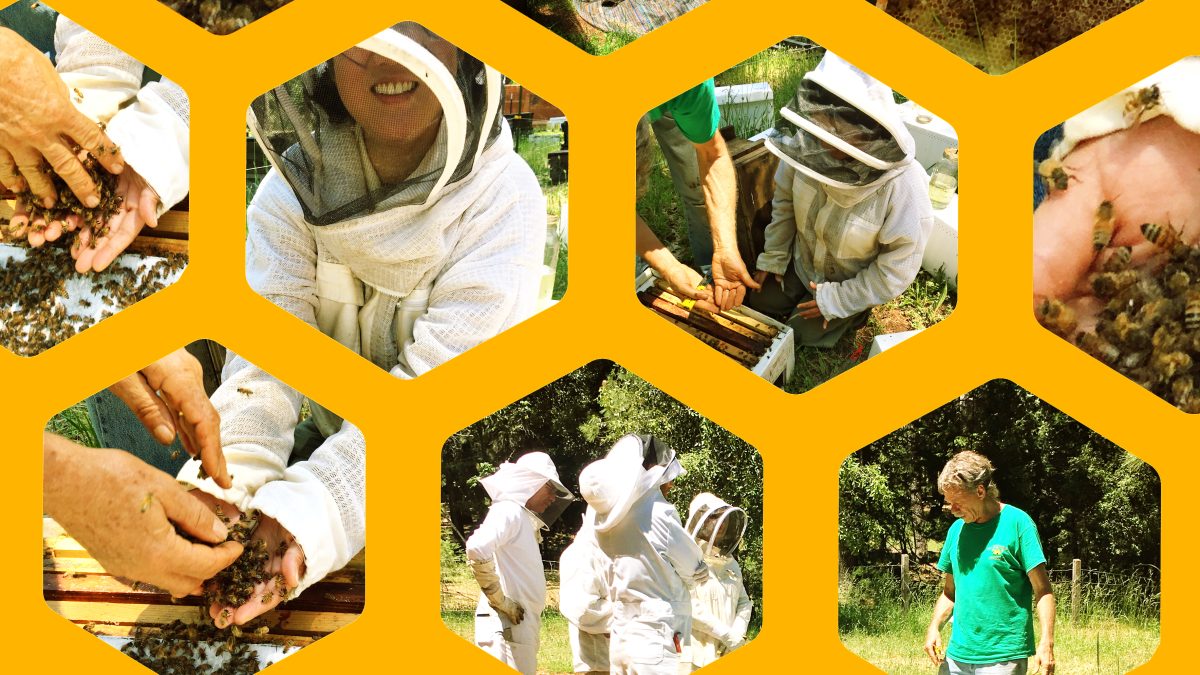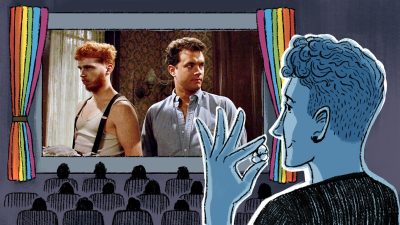Columns Backyard Politics
What I Learned from the Master Beekeeper
He prefaces all his beekeeping sessions with a proposal to examine hives without gloves. It teaches a beekeeper to be more gentle. It’s easier to be gentle without gloves.
This past summer, I drove four hundred miles round trip to visit Randy Oliver, a notable beekeeping expert and researcher. The visit was negotiated far in advance, so as to respect Oliver’s beekeeping schedule. So in mid-June, after the busy months of almond pollination and queen breeding season, several of us drove up into the Sierra foothills from the Bay Area. We were: a beekeeping mentor, a psychiatrist, a retired dermatologist, a violin teacher, a cinematographer who happens to be allergic to bees, and me, a writer.
I’d done this drive regularly back when I was married. Adam and I used to go backpacking in the Sierras, sometimes as often as two weekends a month during peak season. I remember being wedded to a map, wanting guidance, while Adam itched to go off-trail. He would wonder aloud about the roads beyond the freeway—in the dry hills past the San Francisco Bay, then the Carquinez Bridge aside the C&H sugar factory in Crockett, California.
There too was a rare car dealership on a stretch of freeway along the brackish water of the delta. This was where the bugs would hit the windshield. He would often ask—no, say —to pull over and look at a car. His restlessness would drive through Sacramento, before wending its way up into the Sierras, where the air became thinner and the car’s horsepower dimmed.
It was in Tahoe, on one of our trips, that I had my stroke. It left me with a fifteen-minute short-term memory, rudderless without my brain’s executive function, map-less. And now, my memory fully-recovered years later, the drive to the mountains became a reflection of my journey toward bees—to keeping them, to being saved by them.
Meanwhile, the van with the other beekeepers called me. Over my car’s speaker, I heard, “Do you have any questions for Randy?” They were having a discussion about bees and were interested in my input. I could see the figures in the van ahead of me still in anticipation.
No, I said. I’m just going to listen and watch.
*
The last stretch of the drive is particularly picturesque. We slow along a winding lane, lined with pine trees showering dappled light. We miss the turn off for Oliver’s bee yard and eventually crawl back to a weathered sign that says, “Honey.” We have arrived.
A moment later, Oliver appears, simultaneously saying hello and announcing his return the night prior from an out-of-town trip to give a talk. He doesn’t look at all jetlagged. Wearing only a green t-shirt, jeans, and Teva sandals, he leads all of us, besuited in white bee suits and gloves, out to his yard. We look like a hazmat team following him through the knee-high grass. The bees are everywhere—enough to send a layman into hiding. Enough to make some of the besuited apprentices duck and flinch.
Oliver is weathered and spry, the kind of person you visualize when you think of Western films: a mustache, a gray mop of hair, tanned skin, a squint in his eye. He resembles the Marlboro Man, but he’s no slow-going cowboy. He vibrates energy as he walks, as he stands. At any point, he looks like he’s about to take a leap, even though his movements are smooth and even. Yes, he reminds me of a bee.
His athletic build is in constant movement, even when he opens a hive box. When Oliver speaks about bees, his cadence picks up further, like a child talking about their favorite interest, a boy rattling off all he knows about dinosaurs and then some.
There’s no formality—“We’re going to take a look at some of these nucs here,”—as he lifts the lid of a bee hive and then picks up a frame—“if these nucs have a queen. Ah!” he says uninterrupted—“The bees here are gentle. The queen is likely here. Oh, there she is. A beautiful queen.” Then he closes up the beehive in what feels like one smooth gesture. “If the hive doesn’t have a queen, the bees would vibrate.”
We wonder what he means by vibrate. Don’t all bees vibrate?
I’m just going to listen and watch. We hurry along as he moves to another hive and opens it up. “Who can tell me why this hive,” he says, gesturing at the frames he’s picked up one by one with his bare hands, “has tons of capped brood, but no eggs?”
The other beekeepers murmur. I unfold my hand and hold it out in front of my torso. I temper my Hermione Granger eagerness.
He calls on me.
“Because,” I say, “the queen is dead?”
“Close!” he says, closing up the hive. “The queen is gone—but not dead! We removed the queen! We sold the queen on this nuc!”
He looks at me directly, seeing me for the first time.
Then his eyes snap away. “You see the jerky movement of those bees? Because there’s no queen in there. They’re vibrating.”
I nod. And store that information for later—because I didn’t really see the difference. I couldn’t see the difference in the movement. Couldn’t see the alarm in the bees.
*
Every open space on the property is beset with wooden bee hive boxes. Having been recently split, none of the hives are any higher than two boxes high. From a distance, it looks as if a giant dropped wooden square blocks onto a meadow and then ran off.
There’s not much else here. The Sierra Foothills is a decidedly rural area in California gold country. Its geography is categorized as high desert, which means hot and dry in the summertime, and snowy in the winter. It’s in this setting—not far from Donner Pass, where pioneers came to strike it rich and where very few stayed thereafter—that Randy Oliver raises his bees.
In the past year, Oliver retired from the commercial aspect of the business, having handed it off to his sons, and now focuses full time on research and education. For us, it means watching him investigate the level of hygienic activity occurring in his hives. It means taking a piece of denim and “waxing” the top of the brood comb to reveal whether or not the bees had previously uncovered the cells to kill varroa mites. It means watching him do mite testing with an alcohol wash, using a machine he’d made, one he intends to make commercially available so as to both encourage testing and make testing more efficient for commercial beekeepers. It means studying him open a hive and manipulate the frames, then doing the same on our own. It means listening. It means watching.
Oliver never wears gloves while inspecting his hives, and rarely a veil. In fact, Oliver prefaces all his beekeeping sessions with a proposal to examine hives without gloves. His top reasons for doing so are that they teach a beekeeper to be more gentle. It’s easier to be gentle without gloves.
“You can’t get a feel for what you’re doing with gloves on,” Oliver says. “Sometimes, when I go a month without getting stung, I really miss the sting.”
Here’s the thing: Most beekeepers wear protection for good reason. Beekeepers usually wear a protective white jacket. Sometimes we wear a coverall that covers the torso and legs. We wear a veil that protects our face from bee stings. We wear gloves; after many years of being stung through my goatskin gloves, I now wear cowhide gloves as common practice. And because bees seem to like stinging my ankles, I wear rain boots when doing inspections.
When Oliver opens a hive, he moves swiftly, but smoothly. Though I found myself counting the bees gathered on his bare foot—six bees, for the record—he rarely gets stung. In a subsequent visit, one of his sons opened up a hive, shirtless and in shorts. I wasn’t sure if I was overdressed with my bee jacket or he, underdressed. The lines can get blurred. The message here is that of complete comfort with the bees, that their bees are gentle—one of their greater value propositions in their business of selling queen bees. How else better to send a concrete image of gentle bees than to be near-naked while handling them?
It’s easier to be gentle without gloves. The first time I looked for information on how to do hands-on beekeeping, I ended up on YouTube watching a man named Walls Bee Man. Walls Bee Man inspects his hives without a suit. In fact, he exclusively wears a white tank-top, shorts, and a bandana headband. He does wear shoes. He slaps at bees that sting him and he bangs on the frames when clearing them of the bees. In fact, he bangs the frames on the actual hive. He gets stung an awful lot and, when he does, he grunts like Slingblade. He likes to talk about his marriage and give out marital advice while opening up hives. He loves his wife and he loves his bees.
Oliver too, loves his family. His bee business, after all, is a family business. Oliver too, beekeeps without gloves. He too, loves his bees. But he is gentle in a way that Wallis is not. Oliver understands that he’s essentially lifting the roof off of the bees’ homes each time. For all his swagger, he understands the bees are allowing him into their home. That he is a visitor.
Oliver and I share family; my bees came from his bees. In our apprenticeship, we call his queens, “Randy Oliver queens.” His knowledge is our knowledge too, passed down through his articles in American Bee Journal and through our own mentor and through the multiple educational talks he gives in the Bay Area.
After a few hours of watching Oliver handle bees—opening the nucs up, inspecting for progress and queens, he invites us to inspect hives ourselves. I knew whatever it is we did at Oliver’s bee yard would have to be with the implicit understanding that we mimic his behavior. You have to show that respect by handling the frames and the bees with utmost care, with the rules of their house, not yours.
We learn to hold a frame in a particular way, as vertical as possible, so the nectar and royal jelly don’t drip out of the frames. We learn to hold the frames at their edges, so as to mitigate any damage to comb. We remove frames from the hive slowly, without any jerky movements, keeping in mind to slide them out as vertical as possible, so that we do not scrape the frame and smush bees, or more importantly, the queen bee. We remove the outermost frame, first, because it is the least likely to contain the queen, and thus has the least chance of injuring the queen. Because the first frame is the one that is most difficult to remove.
We follow a protocol for what to look for: bee larvae, capped brood, eggs. A queen. Any abnormalities. The movement of the bees.
We place frames back as carefully as we remove them. Slowly. Vertically. And we push the frames back together, making sure not to squish bees or the queen, before we close the hive. We are calm. We do not breathe heavily on the frames. We move smoothly.
*
On the day after Trump was elected into office, I signed up for a beekeeping class at the Biofuel Oasis, a place that offers urban farming supplies and an extensive beekeeping education program. It’s a uniquely Berkeley institution, started in 2003 by a group of eco-minded women. Its original mission was to increase accessibility to biofuel, which is processed from vegetable oil. If you have ever driven past a car that smells like it is making French fries, you’ve likely passed a vehicle operating on biofuel.
Of the original founders, only Jennifer Radtke remains today. And it is Radtke who runs the beekeeping education program. During the introduction to beekeeping class, Radtke mentioned her “apprentices” more than once. I wondered how I could become an apprentice.
“Walls Bee Man,” I told Radtke after class, “is just not cutting it for me.”
This drew a chuckle out of the otherwise stoic Radtke, who is a living, breathing beta-blocker. She knew of him. “Yeah,” she said in her laconic way. “He’s really rough with those bees. Riles them up.”
I asked if I could one day become her apprentice. I did not tell her that I was looking to be gentle. That I’d had my home ripped up and intruded upon, that I was a defensive bee looking for a better way to navigate the world, that Walls Bee Man reminded me of the man who’d done the same to me.
I learned over the next two years to be quiet when she talks. To learn her sense of humor. To study hard. To mimic her techniques.
Radtke, like Oliver, dislikes it when her apprentices talk over her, or ask questions when the hive is open. This is poor etiquette, because talking makes one breathe on the bees, which then alarms them. It was with this courtesy that we did our best to behave at Oliver’s bee yard. Because Oliver does not suffer fools. And also, Oliver is Radtke’s mentor.
You have to show that respect by handling the frames and the bees with utmost care, with the rules of their house, not yours. Uptil now, Radtke—Jennifer, as we call her—had been reluctant to take us up to visit Oliver, despite our requests. Jennifer is good about relaying what she’s learned from Oliver during her multiple visits each beekeeping season. And it made us want more, from the source.
But we are aware hers and Oliver’s is a precious relationship, one that she’s cultivated over a course of years. It took over a year for her to garner an invitation from Oliver to bring us up. It was also obvious that not all the apprentices were invited. We were well aware of the context of this visit to a VIP of the beekeeping world.
In other words, we couldn’t fuck it up. Some of us were not so enamored of him; he has a complete and perfect DGAF attitude. He doesn’t honestly care at all about whether or not he is liked. And it shows in his scorn. One of us is allergic to bee venom—he’d had an anaphylactic reaction a few weeks earlier and stayed suited; Oliver’s reaction was to tell him that getting stung builds immunity (which, technically, can be true). But this is the nature of mentorship: A perfect fit for one is imperfect for another.
*
Oliver’s bees were truly gentle. And the hives were small. So I took my gloves off when it was my turn to inspect a hive. Bees can smell fear. They smell the pheromones we give off when we are afraid.
Knowing this, I took a deep breath and a slow exhale before I lifted the cover. I thought about the day and the smell of honey and propolis and woodsmoke in the air. I thought about how gentle the bees were. I thought about how I was going into their home without permission. And how I might want such a visitor to enter.
I saw the bees on the tops of the frames. None of them were looking at me. One way to know you’ve irritated bees is when they look at you. I took my frame tool and pried a frame apart. Pulled it out. Set it aside. I made sure the hive was in good shape—that there was honey, pollen, and brood. I went through the protocol. Through the checklist. I was in Oliver’s bee yard as much as I was in this hive. And I was with my mentor’s mentor and with it, the source of so much knowledge.
While my cowhide gloves would have given me protection, my bare hands made up for it with increased dexterity. I felt the sticky propolis under my fingertips. The errant bee crawling across the back of my hand. The slight vibration on the frame from the buzzing bees. I even had better control over frame removal and replacement. I did not get stung.
Oliver walked over. I happened to be the only visitor to inspect gloveless that day.
“Hold out your hands.”
In Oliver’s bee yard, you do as you are told. So I did.
“Hold on a minute. I’m going to put bees into your hands.”
I was still trying to understand what it was he was telling me, when he scooped up handfuls of bees and poured them into my cupped palms.
“It feels like a million whispers!” It had been a long time since I’d felt such joy.
The bees crawled up my jacket sleeves. Oliver was concerned that they were crawling into my bee suit. They sure were. I could feel them tickling my forearms.
“Oh, it’s okay,” I said. “They’re not stinging me.”
He tried to shake them out of my suit. It wasn’t until I took off my bee jacket a couple minutes later that they were set free. I was giddy. I was elated. There is a picture of me beaming with bees in my palms. Because it was one of the best things I’ve ever experienced.
When people see that picture, they are often stunned not only by the bees on my bare hands, but also by my joy. I am happy, because the bees trust me. The picture is a record of zero fear. This, I think, is the point of pride in gloveless hive inspection.
But for me, it’s not the pride of being gloveless, but of living a life, finally, without fear. I do not fear being abandoned, for I have been abandoned and survived. I do not fear going map-less, because I have rebuilt a life on my own terms. I am the map.







